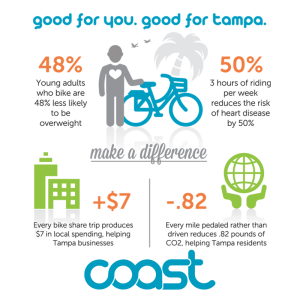As I introduced the Pinellas Countywide Bike Share Feasibility item at the mid-point of Wednesday’s Pinellas County MPO meeting, I jokingly told the board we had allotted one-and-a-half hours for this agenda item. That was immediately followed by laughter. One-and-a-half hours later, we had clear and enthusiastic direction from the board to proceed with next steps, which include exploring potential organizational partners and developing a financial plan for how such a program can begin and expand over time.

Rodney Chatman of the MPO staff presents the findings of the countywide bike share feasibility study.
It was the longest and most energetic discussion of my tenure here as the MPO’s executive director. Every board member participated in the discussion with thoughtful questions and insightful observations. Rodney Chatman of our staff, Eric Trull of Coast Bike Share, and Evan Mory of the City of St. Petersburg helped the board understand the issues, options and implications of a countywide bike share program. You can find the full presentation here and the feasibility report here, and can watch the discussion here.
St. Petersburg is the vanguard for bike share in Pinellas County, and its experience will continue to provide useful lessons for other cities in Pinellas County. The City has been working to implement a bike share program for at least the last year, and is much farther along than any other jurisdiction in the County.
The board members understood that bike share functions best in a compact urban environment with multiple destinations within a one- to three-mile distance where people can use it to run errands, go to lunch or tour around downtown and beach communities. It is effective as a “first-mile, last-mile” extension of public transportation service, helping extend the reach of buses, which generally stay on the arterial roadways and often have full bike racks. Whether connecting a bus or ferry boat to a final destination, bike share can be an integral element of our urban environment in this county.
After the meeting, I came across this blog post by the American Planning Association, noting a bi-partisan bill introduced in Congress that would make bike share eligible for funds dedicated to public transportation. The Bikeshare Transit Act will help pay for everything from bike repairs and keeping rebalancing vans on the road to system expansions and new technology.
While I recognize that bike share is a form of public transportation and applaud that kind of flexibility in use of federal funds, I worry that it could be used to divert needed dollars away from cash-strapped transit agencies that depend on every dime of federal funds they are eligible to receive.
Here in Pinellas County, the Pinellas Suncoast Transit Authority (PSTA) is challenged with funding replacement buses and other capital facilities to maintain a state of good repair, and does not have the operating revenue necessary to expand service at the frequency and coverage needed to attract a larger share of the population. By 2020, hard decisions are needed on how to fund PSTA’s capital program to maintain service levels and expand with key service priorities like the Central Avenue Bus Rapid Transit and express bus service linking Tampa International Airport with Clearwater Beach.
Is bike share the shiny new thing? As we move forward with a potential countywide bike share program in Pinellas, we have to recognize that it’s not a panacea for solving our public transportation funding challenge. It can be an effective component of the multimodal transportation network, and can help to better connect our neighborhoods and destinations, but different parts of Pinellas County are better suited for bike share to succeed because of development density, good facilities and a safe roadway network. Its success outside of one or two cities’ core area or the beaches, as part of a seamless network linking our downtowns and centers, depends on a strong countywide bus transit network with adequate funding to meet the community’s needs. That is an issue we will continue to focus on, and make sure our decisions to support one element of that system do not undermine the effectiveness and legitimate funding needs of a key partner agency like PSTA. I believe our board members understand that. It is something we all need to keep in mind as we move forward in the exciting new world of bike share.










